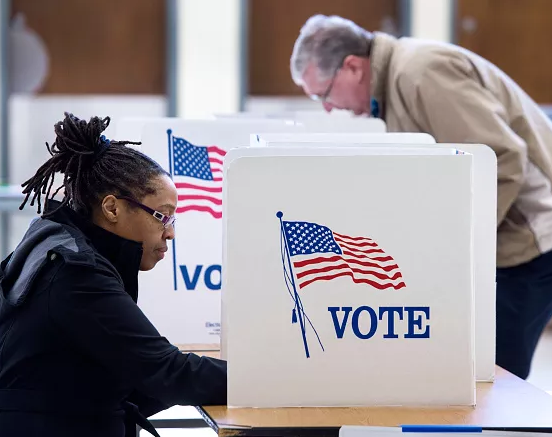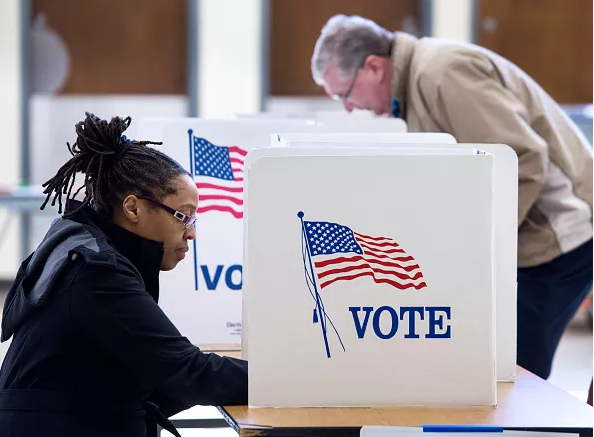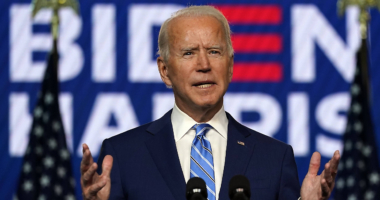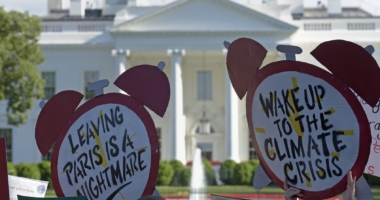Climate, Health and Equity Brief
Climate on the ballot, and reasons for hope
October 30, 2020

The Climate, Health & Equity Brief is GMMB’s take on the week’s news on the current impacts of climate change. If you haven’t subscribed yet, you can do so by clicking here.
Hot Topic: Signs of hope. It’s hard to believe that the U.S. election is just days away. Here at the Brief, we’ve been considering the weight of the last four years and the associated dismantling of nearly 100 environmental protections necessary to sustaining our planet. And yet, we are choosing to be optimistic about the future.
Even in the midst of increasingly devastating climate impacts, we see the opportunity—now in our hands, and just around the corner—to build back better. We are choosing to focus on hope, and to highlight developments from this week that, together with the potential for a change in leadership, point to momentum to fight back in a meaningful way on climate change:
- New poll results reveal that 57 percent of all registered voters in the U.S. support the phasing out of fossil fuels, including an unprecedented 41 percent of Republicans;
- A report has found that even in majority-Republican, fossil fuel-friendly states, energy generation from renewable sources is surging;
- A major investment bank is forecasting that electric vehicles could achieve cost parity with fossil-fuel vehicles within three years, and could make up 40 percent of the global auto market by 2030;
- A newly released plan from the Biden campaign is promoting environmental justice for Indigenous communities and strengthening U.S. relations with tribal nations;
- Measures focused on funding climate plans and advancing a transition to clean energy are on the ballot in seven cities and states across the country;
- Japan and South Korea, among dozens of other nations and municipalities, have announced commitments to become carbon-neutral by 2050; and
- Fifteen U.S. states are now implementing 100 percent clean electricity policies and pollution reduction programs.
Beyond the developments of this week, there are larger forces at play that also give us hope. While COVID-19 has forced restrictions on virtually all aspects of life, the global movement for climate action has continued stronger than ever, with a growing number of youth—and the resounding voice of a 17-year-old activist—leading the way.
And leaders have begun to take action. Governments around the world are looking to green transitions as the key to COVID-19 recovery. These include the EU, which is making a 60-percent reduction in emissions by 2030 a central strategy for its economic recovery, and South Korea, which has committed to creating 1.9 million jobs by developing green technologies.
In the corporate world, dozens of major companies have pledged to go carbon neutral. Some major banks have announced commitments to divest from fossil fuels and achieve global net-zero emissions. At least 13 U.S. coal plants have been permanently shuttered this year, and coal is increasingly being phased out around the world.
We hope that, like us, you’re heading into election week with a sense of stubborn optimism and feeling of hope that meaningful action to support biodiversity, clean air, environmental justice and human health could soon be the rule, rather than the exception, in the United States.
—Matt & Traci, GMMB
2020 Election
Check out this year’s endorsements from the League of Conservation Voters and the Sierra Club, and this 2020 voting guide from Vote Climate U.S. PAC, for the big picture on opportunities to elect climate leaders in federal and statewide races nationwide. (League of Conservation Voters, Sierra Club and Vote Climate U.S. PAC)
As you watch for presidential and congressional results this election day, make sure to also keep an eye on these climate-related measures on the ballot in seven U.S. cities and states. (Grist)
With just four days left before the election, check out these six takeaways on what is at stake for the future of climate change and energy in the 2020 election. (NPR)
Politics & Economy
A new poll found that 57 percent of registered voters in the U.S.—including 41 percent of Republicans—support a complete phasing out of fossil fuels in favor of renewable energy. (Our Daily Planet)
Investment bank UBS forecasts that battery-powered electric vehicles will cost the same to manufacture as fossil fuel vehicles by 2024 and that the global EV market could reach 40 percent by 2030. (The Guardian)
A new report found that renewables are surging even in fossil fuel-friendly states, with Iowa, Kansas and North Dakota now generating enough energy from renewables to meet more than half of their overall electricity demand. (Forbes)
Health
A new study revealed that long-term exposure to air pollution may have caused 15 percent of global COVID-19 deaths by aggravating comorbidities that lead to fatal infection outcomes. (Al Jazeera)
With more than five million acres already burned across the Western U.S., extreme winds in Southern California this week fueled two new major wildfires that have forced nearly 100,000 residents from their homes. (The New York Times, The Washington Post)
After becoming the fifth storm to make landfall in Louisiana this season—the most ever in the state—Tropical Storm Zeta has left at least three people dead and more than 2.6 million others without power as it pummels the U.S. Gulf Coast. (CNN, The Weather Channel)
Equity
A recently released Plan for Tribal Nations from the Biden presidential campaign calls for investments to increase climate resilience and clean energy infrastructure in Indigenous communities, among other environmental justice measures. (Grist)
New York officials re-emphasized their focus on environmental justice in the transition to a green economy this week, promising to reduce the state’s dependence on polluting sources of power that disproportionately impact low-income communities and communities of color. (Axios)
Action
Japan and South Korea became the latest countries to commit to carbon-neutrality by 2050 this week, with leaders in both countries calling for a shift away from coal and other fossil fuels in favor of renewable energy. (The Washington Post, Reuters)
Kicker
Ever wonder how your state generates electricity? Check out this interactive tool to see how electricity generation has evolved across all 50 U.S. states since 2001.






